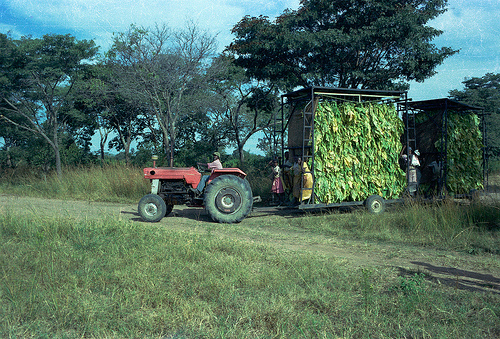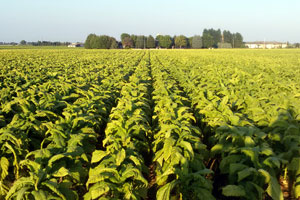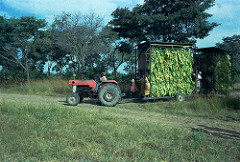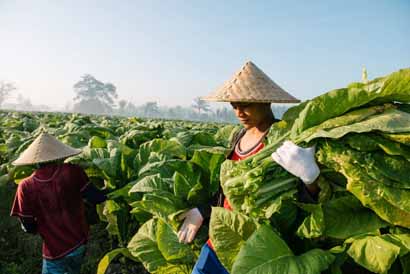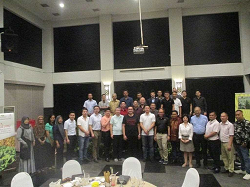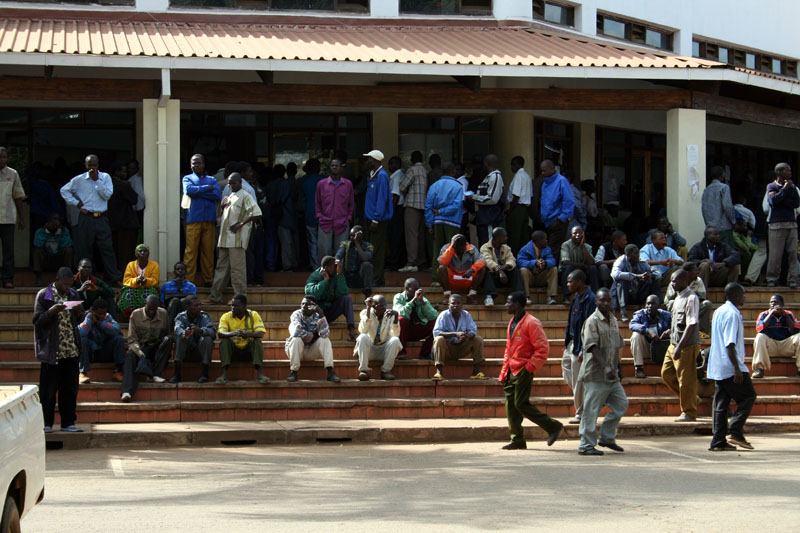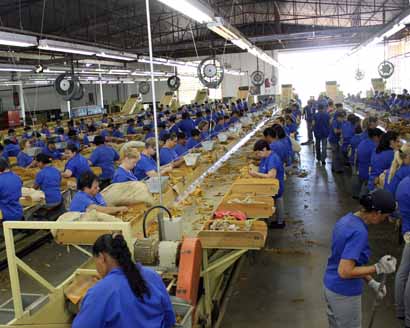Zimbabwe’s central bank has said it plans to sell bonds to allow citizens living outside the country to invest in the country’s tobacco and gold, according to a story by Godfrey Marawanyika and Renee Bonorchis for Bloomberg News.
The Reserve Bank of Zimbabwe said it would provide more information on the diaspora bonds ‘in due course’.
At the same time, banking rules are being introduced with the intention of encouraging money flows and exports.
Under the rules, lenders must give exporters access to all of the foreign currency they received from selling goods, within 14 days of the funds being deposited.
And small, non-corporate exporters shipping more than $2,000 of goods no longer need fill in certain forms.
The new policies and plans come three months after the former president was replaced by the former deputy president, Emmerson Mnangagwa, who is said to be on a drive to revive the economy and attract investment.
The new administration will allow white farmers to apply for 99-year leases on land, up from five years previously.
And it has pledged to compensate them for improvements they made to land that was seized.
The Bloomberg story is at: https://www.bloomberg.com/news/articles/2018-02-19/zimbabwe-plans-gold-tobacco-diaspora-bonds-as-bank-rules-change.
Category: Leaf

Zimbabwe moving on

Zimbabwe plantings down
Zimbabwe has less land under flue-cured tobacco this season than it had during the 2016-17 season, according to a story in The Herald.
The Tobacco Industry and Marketing Board (TIMB) says that the 5.5 percent drop in tobacco hectarage was been caused by poor rainfall distribution.
In its latest crop assessment report compiled with Agritex after an assessment undertaken from January 22 to February 2, the TIMB said 104,397 ha were put under tobacco this season compared to 110,518 ha last season.
The late onset of rains followed by a prolonged dry spell meant that the dryland crop was more affected than was the irrigated crop, which is now being harvested, cured and graded.
‘Most of the cured leaf is lemon to orange in color and of fair to good quality,’ said the TIMB. ‘Some of the farmers have already started grading. The average yield from this planting is expected to be around 2,300 kg per ha.’
The bulk of the dryland crop, which was planted from about the middle of October to the end of November, is now fully-grown. But because of the unhelpful weather, some farmers had to replant, which resulted in an uneven crop in some areas. The expected average yield is around 1,700 kg per ha.
Zimbabwe disease alert
Concerns have been raised in Zimbabwe about the resurgence of Potato Virus Y in tobacco, according to a story in The Herald.
PVY, a viral disease that is said to have been under control for some years, has apparently resurfaced, and tobacco growers are being blamed.
The government has urged tobacco growers to follow regulations on destroying stalks and crop residues to avoid the spread of pests and diseases.
The Minister of Lands, Agriculture and Rural Resettlement, retired Air Chief Marshal Perrance Shiri, made this call during a familiarization tour of the Kutsaga Research Station on Tuesday.
Shiri said some growers had been witnessed failing to destroy stalks and crop residues in a timely manner and others had been witnessed not destroying stalks completely. “Now, we end up with these challenges,” he said.
“We need to change the way we do things. We need to be responsible. We had grown a viable industry, which contributes immensely towards the economy of this country and in particular earning foreign currency. We seem to be gradually destroying the industry through the failure to comply with legislation of destroying stalks.
“I call upon farmers to be responsible. It is our responsibility, all of us, to look after the industry that has sustained us. It is there to sustain the economy of the country,” he said.
Zimbabwe’s Plant Pests and Diseases Act requires that tobacco farmers destroy tobacco stalks on or before May 15.
Tobacco Research Board general manager Dr. Dahlia Garwe also expressed concern over the disease, which she said had the potential significantly to affect tobacco production in Zimbabwe.
“We are extremely concerned about the incidence of the PVY,” Garwe said. “Our farmers have for a number of years ignored the legislation that was put in place to keep PVY on check. “Now we are starting to reap the ‘benefits’ of our sins. The fact that we have failed to observe the legislation has meant that we are now seeing an outbreak of a disease that has been under control.”
Garwe was quoted as saying that tobacco farmers were now growing crops of potato, tomato and pepper on the same land on which they grew tobacco. “The crops have the same pests and diseases, so if a tomato crop has been affected by PVY, that disease will also move into tobacco,” she added.
Seeking new alliances
Alliance One International’s volume sales during the nine months to the end of December, at 255.8 million kg, were 1.7 percent up on those of the nine months to the end of December 2016.
In announcing its nine-months and third-quarter results, the company said the higher volume was made possible by South America’s crop having been returned to a more normal level after the weather-affected, smaller crop of the previous year, and by the timing of shipments in North America, offset by volume decreases in Africa caused by unhelpful weather, primarily in Malawi.
Total sales and other operating revenues were said to have increased by $97.0 million to $1,202.1 million because of a 7.5 percent increase in the average sales price brought about by a favorable product mix, primarily in South America, North America, Asia and Europe, and because of the increase in volume sales.
Average tobacco costs per kg increased by 7.9 percent because of the product mix and the impact of European currency movements, partially offset by lower conversion costs.
‘Gross profit increased 14.7 percent to $171.5 million and gross profit as a percentage of sales improved to 14.3 percent from 13.5 percent last year,’ Alliance said. ‘The increase in gross profit was driven by revenues increasing by 8.8 percent with total costs of goods and services sold increasing by 7.9 percent. The larger South America crop size this year was the primary driver of processing and other revenues increasing 2.1 percent, with processing costs decreasing 10.1 percent from lower conversion costs.’
President and CEO Pieter Sikkel (pictured) said, fiscal year 2018 continued to progress in line with the company’s expectations. “We achieved solid sales growth during the third quarter when compared to last year,” he said. “Our volume sold has increased, as crop sizes have returned to more normal levels in many key markets despite reduced crop sizes in Africa.
“We are pleased with this quarter’s results and with the continued progress against our key initiatives and strategic objectives.”
Sikkel said he was excited to announce that Alliance One had embarked on an ambitious transformation plan called ‘One Tomorrow’. “This initiative will drive future growth opportunities and reshape our brand as the trusted provider of responsibly produced, independently verified, sustainable, and traceable agricultural products and services,” he said. “As part of our ‘One Tomorrow’ long-term business strategy, we are actively developing new business lines and building upon the strength of our core operations.
“Most of our new business lines focus on products that are value-added or require some degree of processing. These products generally have higher margin potential than our core business and play well to our strengths.
“In January, we successfully acquired majority stakes in two new joint ventures. The extension into growth segments, namely e-liquids, industrial hemp and cannabis, expands Alliance One’s presence in higher-margin, fast-growing categories.
“We intend to broaden our business portfolio over the next three to four years by focusing on consumer-driven agricultural products, with increased operating margins when compared to our historical leaf processing business.
“Consistent with our commitment to growth and incremental to our core leaf earnings, our goal is to generate a significantly increasing portion of our profit from new, higher-margin businesses by 2020.”
Watching the weather
If weather conditions are normal this year, Indonesia should be able to produce up to 200,000 tons of tobacco, according to a story in Indonesia Investments.
The planting season is due to start in May provided the rainy season ends in April or early May.
Last year, the country is estimated to have produced 160,000 tons of tobacco, 129 percent more than the previous year’s production of 70,000 tons, which was hit by unusually wet weather during what is normally the dry season.
Meanwhile, Budidoyo Siswoyo, chairman of the Indonesian Tobacco Community Alliance (AMTI), has urged the government to encourage partnerships between local tobacco farmers and the cigarette industry.
Such partnerships would impact positively on the quality and quantity of the tobacco produced, and enhance the welfare of farmers, Siswoyo said.
One of the problems in the tobacco industry was that there existed a long line of middlemen between the cigarette industry and the small farmer, who wound up being paid low prices.
Star Tobacco expanding
Far East Leaf Indonesia (FELI), a wholly owned subsidiary of Star Tobacco International, has inaugurated its new headquarters in the former embassy building of the East Timor Consulate in the diplomatic suburb of Renon in Denpasar Bali.
A Star press note issued on Tuesday, said the event was attended by more than 20 major clients and 10 major suppliers of FELI.
‘FELI has been active in Indonesia over the past five years and has become a mainstream supplier to small and medium companies in the Java region,’ the note said. ‘This success can be attributed to FELI’s investment in infrastructure in tobacco storage depots in Jebel…’
The storage facility is said to carry a full range of imported Virginia, Burley and oriental tobaccos, as well as reconstituted tobacco and fines.
FELI is also a major exporter of Indonesian tobaccos to Star cigarette- and cigar-producing clients in Europe and Central America.
The inauguration (pictured) was hosted by Mehmet Ayyildiz, FELI’s vice president.
Meanwhile, earlier this month, Star Tobacco International announced the opening of its new headquarters in Istanbul, Turkey.
In a press note issued on Friday, Star said the previous building had become inadequate to support the growth of the company; so it had moved into a six-floor building.
The new building had enough space for 50 employees and included a conference floor and a social floor for the use of employees during their spare time.
The new headquarters is at: Mecidiye Mahallesi, Taş Basamak Sokak. No: 15 Beşiktaş-Ortaköy, İstanbul, Turkey.
Malawi crop down
Malawi’s Tobacco Control Commission (TCC) says the first crop assessment for this season has put the all-types volume 12.8 percent below the trade requirement of 171 million kg, according to a story in The Maravi Post.
The dip in the estimated volume has been put down to prolonged dry spells in some districts of the southern and central regions of the country; but the commission was said to be optimistic that rain could still lift the volume.
TCC CEO, Kaisi Sadala, was quoted as saying that a second crop estimate would be made in the coming weeks, which would assist in determining the market opening date.
Sadala said the TCC expected that the second volume estimate would be up on that of the first because most parts of the country were currently enjoying good rains.
He said the Commission was impressed with farmers abiding by the restrictions of the quota system, something that would help to reduce over production, which affected prices.
TCC figures show that 42,303 farmers registered to grow tobacco during the 2017/2018 season, down from about 45,000 in 2016/2017.
The registered quota was 169,785,243 kg, below the buyer requirement of 171 million kg.
Universal looking forward
Universal Corporation reported yesterday that its net income for the nine months to the end of December was $75.1 million, or $2.94 per diluted share, compared with $73.4 million, or $2.63 per diluted share, during the same period of the prior fiscal year.
For the third fiscal quarter to the end of December, net income was $45.4 million, or $1.78 per diluted share, compared with net income for the prior year’s third quarter of $53.6 million, or $1.92 per diluted share.
Net income for the nine months and third quarter included a one-time reduction in income tax expense of $10.5 million, or $0.41 per diluted share, resulting from the enactment of the Tax Cuts and Jobs Act in December 2017.
Operating income for the nine months to the end of December of $111.2 million was down by $7.3 million compared to that of the nine months to the end of December 2016. Operating income for the third quarter of fiscal year 2018 fell to $59.7 million from $83.2 million.
“As expected, our earnings from operations so far in fiscal year 2018 have been impacted by lower Burley crop volumes in Africa and fewer carryover crop sales in North America, offset in part by the return to normal crop volumes in Brazil, where we continue to see the benefits of higher volumes and lower factory unit costs,” said George C. Freeman, III, Chairman, President, and CEO. The Burley crop shortfall will predominately affect our third and fourth fiscal quarters when we typically ship African crops.”
Looking ahead, Freeman said Universal expected that its volumes for the fourth quarter of fiscal year 2018 would be lower than those achieved in the fourth quarter of the prior year, given reduced crop volumes available for sale in Africa this year, which typically had strong shipment volumes during the fourth fiscal quarter. “As a result, we continue to believe our total lamina volumes for fiscal year 2018 will be modestly lower than those volumes in fiscal year 2017.
“Looking forward, the next crop cycle, which will be reflected in our fiscal year 2019 results, has begun with green tobacco purchases in Brazil. The crop season is off to a good start, and assuming the recovery of African volumes and overall market stability, we believe that our fiscal year 2019 total sales volumes will be higher.”
Tree levy opposed
Zimbabwe’s Federation of Farmers Union chairman Charles Chabikwa has said that tobacco farmers are threatening to boycott a reforestation levy ahead of the opening of the 2018 marketing season, according to a Newsday Zimbabwe story relayed by the TMA.
From January 2015, the government introduced a levy on all tobacco sales at a rate of 1.5 percent in the first year and 0.75 percent in subsequent years as part of a sustainability initiative aimed at funding the planting of trees to replace those burned as fuel in curing tobacco.
“The levy has been in effect for three years, with close to US$20 million collected from farmers and not a single tree seedling has been planted or sustainable tobacco curing projects embarked on,” said Zimbabwe Tobacco Association chief executive, Rodney Ambrose.
“It is our view that the levy should be removed effective this 2018 season and the funds accumulated to date first accounted for and utilised by farmer stakeholders.”
The Tobacco Industry Marketing board said of the US$19 million collected since 2015, US$4 million was in the board’s account.
Warning: middlemen
Zimbabwe’s Tobacco Industry and Marketing Board (TIMB) has warned farmers to sell their tobacco only through normal channels and in accordance with official trading practices, according to a story in The Herald.
Otherwise, the TIMB warns, farmers risk being cheated by unscrupulous middlemen, some of whom buy crops for low prices at the farm gate and later sell it at higher prices on the auction floors.
In most cases, the Herald reported, farmers sold their crops at low prices to avoid travelling to Harare, but in some instances middlemen misrepresented information to farmers to force them to sell their crop outside the official system.
Addressing farmers in Headlands, TIMB technical services manager Blessing Dhokotera said farmers should sell their crop through normal channels if they wanted fully to enjoy the fruits of their labor.
“Tobacco growers are entitled to a foreign currency incentive facility, which was recently increased from five to 12.5 percent,” Dhokotera said. “If you sell your crop through middlemen, they will get the incentive when you are the one who would have worked hard producing the crop.”
The Herald story said that some tobacco growers were in the habit of not registering with the TIMB in order to sell their crop without paying registration fees. Such farmers sold their crop using registered farmers’ numbers.
But Dhokotera said that in so doing, the farmers did not receive their incentive, since it was given to the registered grower.
At the same time, he attempted to discourage farmers from believing that they could influence prices on the floors by paying money to third parties, because, he added, it was good quality tobacco that would attract better prices.

